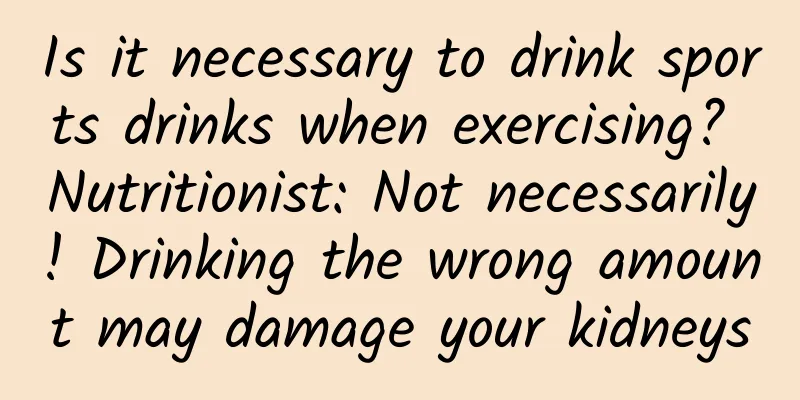Is it necessary to drink sports drinks when exercising? Nutritionist: Not necessarily! Drinking the wrong amount may damage your kidneys

|
The human body is 60-70% water. Almost all metabolism and biochemical reactions in the body must be carried out in aqueous solution. Once the brain loses water, it may cause headaches and even cognitive dysfunction due to dehydration. When the body loses 1% of its body weight in water, it starts to feel thirsty. A study published in the journal Medicine & Science in Sports & Exercise found that if a person is dehydrated by 2% of their body weight, it will cause damage to their cognitive function. For example, a 60-kilogram person will begin to have problems such as inattention and motor coordination problems if he or she is dehydrated by 1.2 kilograms of water. The gradually increasing high temperatures in summer have already caused the human body to become unconsciously dehydrated. If coupled with excessive sweating and electrolyte loss during exercise, it is more likely to cause dehydration, which may lead to heat stroke and heat exhaustion. In severe cases, symptoms such as arrhythmia, acute renal failure, rhabdomyolysis, or coma may occur. Therefore, it is necessary to replenish water and electrolytes appropriately during exercise, but the key point is who needs to replenish? How to supplement? What to add? This is what we will discuss next. Three main purposes of sports drink supplementation In fact, in addition to water, sweating during human exercise is also accompanied by the loss of salt, electrolytes such as sodium, chlorine, potassium, calcium, magnesium, and energy. Therefore, sports drinks have three main purposes:
Which beverages are not suitable for drinking during exercise? Let’s start by talking with nutritionist Jian Mingru about what drinks are recommended not to be consumed during exercise? 1. Carbonated drinks: Many athletes want to have a bottle of ice-cold, bubbly soda, cola or other carbonated drinks after exercise and finish it. In fact, although the carbon dioxide contained in carbonated drinks has a heat-dissipating and cooling effect due to its volatility, it can also cause gastrointestinal bloating and easily cause stomach cramps or vomiting. 2. Fruit juice drinks: For example, orange juice, often contains too high a proportion of sugar and is a high osmotic pressure beverage. It will slow down the emptying rate of the stomach and the gastrointestinal tract's ability to absorb water, causing dehydration during exercise to be unable to recover quickly, or even nausea and vomiting. 3. Coffee and tea: These two types of beverages are actually diuretics, so they are not conducive to water retention and absorption. In addition, although there are studies showing that caffeine is beneficial to metabolism, excessive intake can cause palpitations or anxiety, so caffeine intake should be kept in moderation (the maximum daily caffeine intake per person should be limited to 6 mg per kilogram of body weight). 4. Alcoholic beverages: such as beer. In fact, alcohol can cause dehydration, so drinking after exercise will make you more thirsty. In addition, alcohol metabolism will increase the burden on the liver and will not be conducive to recovery after exercise. The key to hydrating during exercise: temperature and amount How should we replenish water during exercise? Nutritionist Jian Mingru proposed two key points: 1. Water temperature: Avoid drinking too cold water (close to 0 degrees C). It is best to drink warm water, 8 to 14 degrees C is best (it passes through the stomach faster and is better absorbed by the human body). 2. Water volume: It is not advisable to drink a large amount of water at one time before, during and after high-intensity exercise. You can replenish it once half an hour before exercise, and 150~200CC is recommended at a time. During exercise, replenish water every 15 to 20 minutes, and the total water intake per hour should not exceed 600 CC. This way, you can achieve a balance between quenching thirst and hydration without causing gastrointestinal burden due to excessive water. Please remember to drink slowly after exercise to avoid drinking large amounts of water when sweating and thirsty, which will cause burden to the body and stomach. Should I drink water when exercising? Or is "sports drink" better? Many people want to know whether to simply replenish water or choose sports drinks during exercise. In fact, it depends on your exercise condition: ● If the intensity is low and the exercise time is not long, you only need to replenish water (because you will not lose too much electrolytes) ● If you are exercising at a high intensity, for a long time (expected to be more than an hour), or sweating a lot, the loss of water and electrolytes will not only affect your exercise condition and energy consumption, but will also affect the body's osmotic pressure balance, so it is recommended to supplement with sports drinks. The National Health Administration of the Ministry of Health and Welfare recommends that you only need to drink sports drinks if you exercise for more than an hour and have obvious panting and sweating. The principle amount of drink is 600 ml for boys and 400 ml for girls. Recommended ways to choose sports drinks There are many brands of sports drinks on the market. It is recommended to choose according to the following:
Who doesn't need sports drinks? (Please continue to the next page) Who doesn't need sports drinks? Sports drinks are electrolyte drinks containing sugars. They are mainly targeted at fitness enthusiasts who consume a lot of physical energy and perform high-intensity endurance exercises, such as marathons, triathlons, football, cycling, etc., or people in special circumstances such as those with a high fever. So who doesn’t particularly need it? Generally, people who are not habitual athletes (or only do light exercise) do not need to take sports drinks as a health drink every day. Otherwise, it will increase the burden on the kidneys and may even increase calorie intake due to the sugar content in sports drinks. In addition, weight trainers in the gym do not need sports drinks because they are not exposed to the sun and have air conditioning and do not sweat much. Of course, people with kidney disease are not recommended to use sports drinks because they need to control the electrolyte levels in their bodies. If you really feel the need, it is safer to discuss it with a doctor first. [Tips from sports nutritionists] Nutritionist Jian Mingru from the Taiwan Fitness Association concluded that sports drinks do have their role in replenishing electrolytes and carbohydrates, but for people who do not exercise much, they are not necessarily drinks that must be replenished during exercise. However, as long as they are not consumed excessively, they will not cause too much burden on the body. But what if you really want to drink? It is recommended to choose isotonic sports drinks and dilute them with water in a ratio of 1:1 or 1:2 (sports drink: water). This not only satisfies the taste but also does not cause any burden to the body. It is also an option. Simply put, keeping your body in balance is the key to health. |
Recommend
How to prevent chronic cervicitis?
How to prevent chronic cervicitis? Many people do...
Slimming tea causes trouble! Woman dies of fulminant hepatitis after drinking for one week
To reduce fatty liver, you should proceed step by...
The main things to note about cervical hypertrophy in daily life
There are many reasons for cervical hypertrophy, ...
Why do we need to do B-ultrasound examination before abortion?
Why do we need to do B-ultrasound examination bef...
Why can't women's cervical erosion be cured for a long time? There are three factors to consider when women's cervical erosion cannot be cured.
Doctors remind women that they should not have se...
Can drinking salt water help you lose weight? Famous weight loss doctor: Be careful of the high risk of regaining weight
Can drinking salt water help you lose weight? The...
Sitting for a long time can cause cervical erosion in women
Cervical erosion is not a disease, but a manifest...
What anti-inflammatory drugs should be taken after abortion? Which is less harmful, abortion or medication?
What anti-inflammatory drugs should I take after ...
Hospital arrests prostitute! Over 5,000 people participated in the Hongluodi Walk
As spring comes and flowers bloom, the best way t...
What are the causes of irregular menstruation? How to regulate irregular menstruation? Find it here
Irregular menstruation may be caused by iron defi...
Symptoms of uterine fibroids Are there no symptoms of uterine fibroids?
As the saying goes, location is important. It doe...
Talk about the early symptoms of candidal vaginitis
Compared with other types of vaginitis, candidal ...
What is the best time to have an abortion?
Abortion is the fastest way to terminate an unwan...
Can’t lose weight! 40% of Americans will be obese by 2030
Affected by the long-standing dietary culture and...
What are the symptoms of cervicitis and cervical hypertrophy
Symptoms of cervicitis and cervical hypertrophy i...









